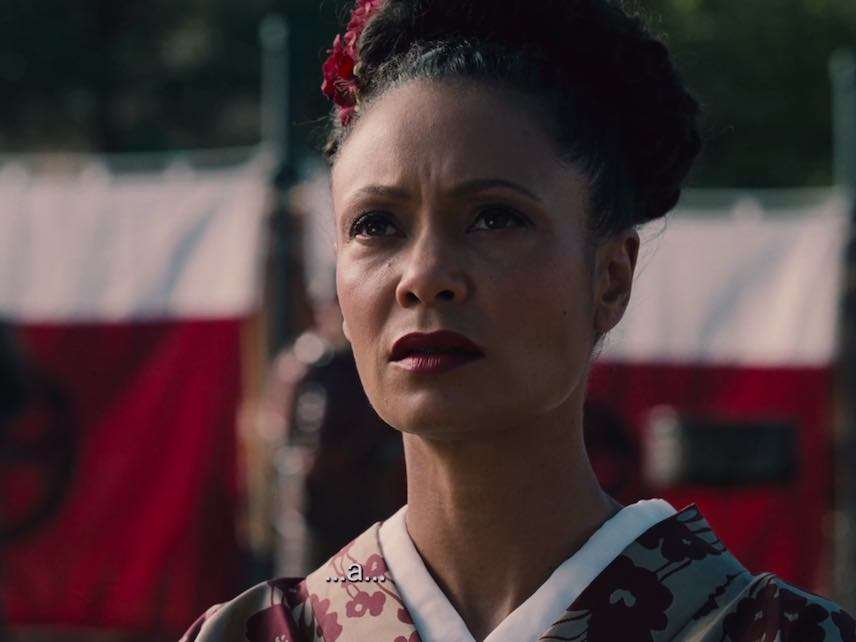Westworld Review: 'Shogun World' Is a Video Game, and Maeve Is Leveling Up
"Akane No Mai" is about video game characters, and who's really in control.

I spent most of my Sunday playing the just-released Hyrule Warriors: Definitive Edition for the Nintendo Switch. While the game is Legend of Zelda themed, and features characters, music, items, and settings from the beloved Nintendo franchise ("Hyrule" is Princess Zelda's kingdom), it isn't a proper Zelda game. Instead, it belongs to Tecmo Koei's Dynasty Warriors series—a family of video games highly relevant to last night's Westworld episode, which finally saw several main characters enter the much-anticipated "Shogun World."
Dynasty Warriors takes place in Three Kingdoms era China (roughly 180-280 A.D.), following the collapse of the Han Dynasty. Players take control of one of dozens of characters based on fictionalized versions of historical persons—like the ambitious politician Cao Cao, cunning strategist Zhuge Liang, or invincible yet arrogant warrior Lu Bu—and then must fight their way through a series of battles based on events that actually happened centuries ago. Obviously, things don't always turn out the way they did in real life: Cao Cao was defeated at the Battle of the Red Cliffs in 208 A.D., but if you're playing as him in Dynasty Warriors, you have to win that one or its game over.
Hyrule Warriors isn't the only Dynasty Warriors spin-off game. (I'm getting to Westworld, I swear.) There's also Samurai Warriors, which takes place during Japan's Edo period in the 17th century, which saw the warlord Ieyasu Tokugawa consolidate the nation under his control. Tokugawa is an important figure in Japanese history: his shogunate effectively ruled Japan until the emperor's authority was re-asserted in the mid 1800s.
In "Akane No Mai," the fifth episode of Westworld's second season, "woke" Maeve and her entourage make their way into "Shogun World," where the eponymous shogun murders an innocent young geisha and then forces her mother figure to dance for him, with predictably vengeful results. Some reviewers evidently thought it was problematic to depict a stereotypically eastern world sprung from the imaginations of white people—even though the show has clearly positioned the white people who designed the park as the bad guys. Just as Westworld the park isn't completely faithful to the American old west, instead relying on various cowboy tropes, so too is Shogun World a combination of realism and fantasy.
But back to the shogun: he's clearly supposed to be some version of Ieyasu Tokugawa. The shogun mentions that he "killed 2,000 men in the Siege of Osaka," which was the ultimate showdown between the historical Tokugawa and his last rival for dominance, Hideyori Toyotomi. I only know this because the Siege of Osaka is the final battle for the relevant characters in Samurai Warriors. (It's a lot easier to win on Tokugawa's side.)
I've written previously that Westworld is in many respects an ode to video games. (It's also occasionally a reflection on modern society's fear of data breaches, a straightforward robot uprising tale, a clone of Jurassic Park, and perhaps most bizarrely, a love letter to Lost—another sci fi TV series beloved by this reviewer.) "Akane No Mai" makes this even clearer. We literally watch Maeve performing the seminal video game task of "grinding": fighting weaker enemies over and over again until she has sufficiently boosted her stats and is ready for stronger foes. This is frequently a necessary task in the Dynasty Warriors series, and countless other games. At first, Maeve needs to give vocal commands to overpower the shogun's foot soldiers; by the end of the episode, she has learned to soundlessly control them. She's leveling up before our very eyes.
Of course, with real video games, there's a person controlling the character, pressing the buttons that make their guy (or girl) swing a sword, or fire a gun, or step on a Goomba. What's fun about Westworld is that the video game characters seem like they are finally controlling themselves. There's a bit of uncertainty there, though. Is Maeve really rebelling against her programming, or is she merely following a path that the deceased (but probably not gone, if last week's revelations about the potential for immortality are any indication) Robert Ford laid out for her?
Maeve ends the episode by declaring, "I've found a new voice." In a literal sense, she means that she's discovered an inner voice with which she can control the other hosts—though the line recalls Ford's explanation of the "bicameral mind" theory of consciousness from season one, which supposed that entitites needed to hear their own thoughts in their heads, as if the gods were speaking to them. Dolores claimed to have discovered her own voice inside her head, and this revelation had something to do with her awakening as a supposedly automonous, fully conscious being. She's now ostensibly following her own path, and one that increasingly seems like it will lead her to erase the less-well-developed consciousnesses of every other host in the park. (The dead hosts that will be pulled out of the water after whatever calamity befalls them have blank minds, we learn in a flashforward to the near future.) And yet I still can't shake some nagging suspicion that this new voice is neither Dolores's, nor Maeve's, but someone else's. As impressive and powerful as these video game characters may seem, there's always somebody holding the controller.


Show Comments (18)